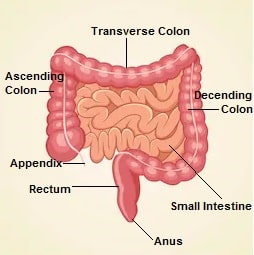Crohn's Disease
Crohn’s Disease
Crohn’s disease is an inflammatory bowel disease (IBD) caused by inflammation of GIT. This condition is characterized by abdominal pain, severe diarrhea, fatigue, weight loss and malnutrition. Crohn’s disease can involve different parts of small and large intestine. Onset is usually gradual.
Symptoms
Active Crohn’s disease have following signs and symptoms:
- Loose motion
- Weakness
- Fever
- Sores in mouth
- Decrease appetite
- Weight loss
- Blood in stools
- Fistula around or near the anus
- Eyes, skin and joint inflammation
- Anemia
- Kidney stones
- Delayed growth in children
- Delayed sexual development
Causes
Main cause of this condition is not known. There are several factors that play role in the development of Crohn’s disease. The factors are as follows:
- Over active immune system in the presence of viral or bacterial infection
- Heredity factors
Complications
Complications include:
- Obstruction of bowel
- Ulcers in digestive system
- Fistula in perianal region
- Anal fissures
- Malabsorption leads to anemia and vitamin B12 deficiency
- Colon cancer
- Other disorders like skin disorders, osteoporosis, arthritis, and gallbladder or liver disease.
Diagnosis
Diagnosis of this condition depends upon detailed medical history and complete general physical examination of the patient. Other tests include:
- Blood tests
- Stool tests
- Colonoscopy
- Computerized tomography (CT).
- Magnetic resonance imaging (MRI).
- Capsule endoscopy
- Balloon-assisted enteroscopy
Treatment
Although there is no proper cure for this disease, there are few options to manage the condition.
- Anti-inflammatory drugs like corticosteroids, Oral 5-aminosalicylates are prescribed to reduce inflammation.
- Other medications are ; Immune system suppressors, antibiotics, anti-diarrheals, Pain relievers.
- Surgery is sometimes considered.
- Nutrition therapy
